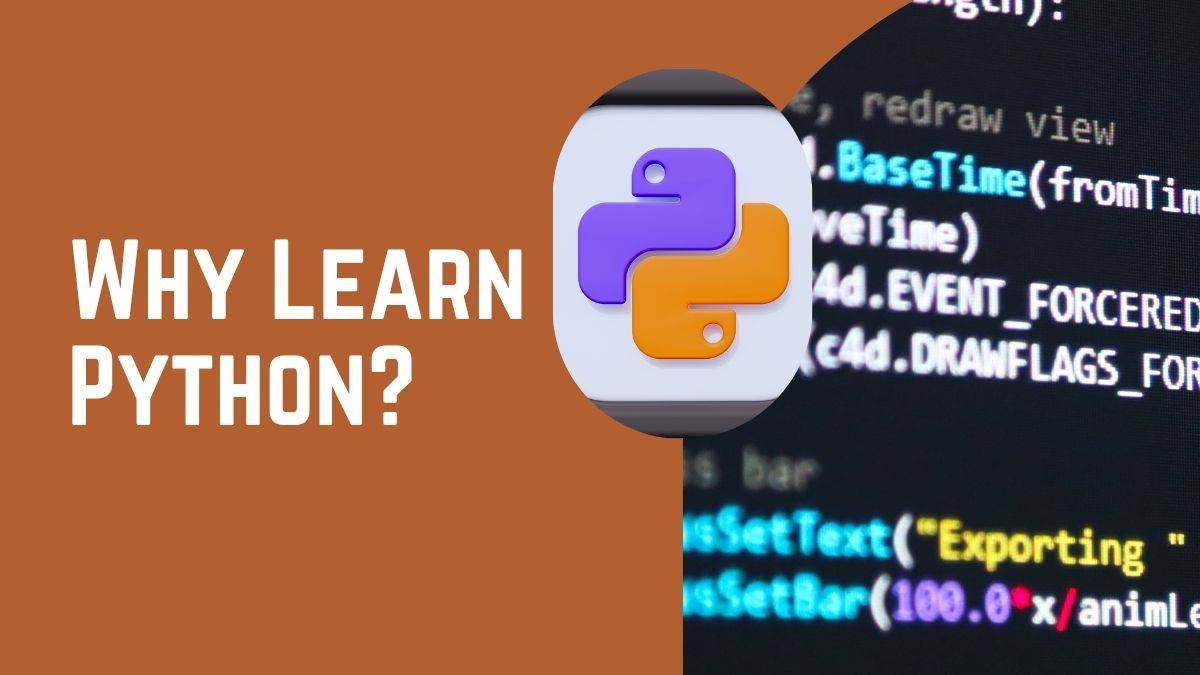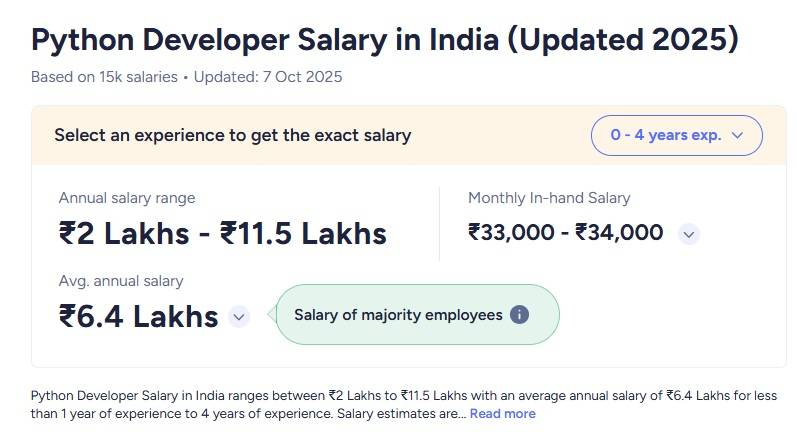Why Learn Python? 10 Key Reasons to Master Python in 2026
Python is a high-level, general-purpose programming language used in creating a number of applications, including smart bots, social media platforms, interactive games and whatnot. Python was developed in 1991 by Guido van Rossum, and since then, it has remained popular among both the developer population and companies. If you are willing to learn Python but are unsure if you should, we are here to help! Here are 10 reasons why learning Python is a great idea from a career perspective. Read on!
- 1. Beginner-Friendly
- 2. Massive Popularity Globally
- 3. Extensive Career Opportunities & High-Paying Jobs
- 4. Supports Web Development
- 5. Adoption by Top Companies
- 6. Libraries to Facilitate Data Science and ML Tasks
- 7. Facilitates Web Scraping
- 8. Offers Ease of Process Automation
- 9. Integrations with Other Languages
- 10. Strong Community Support
- How Long Does it Take to Learn Python?
1. Beginner-Friendly
Python is an absolute beginner-friendly language. It has simple syntax, is extremely close to English, and is easy to read. Python executes code one line at a time-linearly-and in such a way that you can see and modify results in real time. Nor does it need compilation, so writing and comprehending code is much less confusing for a newcomer.
2. Massive Popularity Globally
Python now ranks third in the most popular programming languages in the world. It is simple, multipurpose, and contains a great variety of free libraries. Python is free and open-source and has been open-source for over 20 years. It is managed by the Python Software Foundation, a not-for-profit organisation that owns all intellectual property rights related to Python. In summary, Python has become almost an obligatory language for AI/ML, Data Science, Web Development, and Automation.

3. Extensive Career Opportunities & High-Paying Jobs
Python is one of the most in-demand technical skills, considering its ease and ever-increasing demand. Companies like Netflix, Yahoo!, Microsoft, Facebook, PayPal, Instagram, and many more regularly have requirements for skilled Python professionals. Salaries are also highly competitive for Python developers. According to Ambitionbox, the average salary of a Python developer in India with 0 - 4 years of experience is Rs. 6.4 LPA as of October 2025.
Popular Python job designations are –
- Python Developer
- Python Automation Engineer
- Full-stack Developer
- Front End Developer
- DevOps Engineer
- Data Scientist
- Machine Learning Engineer
4. Supports Web Development
In web development, Python is the language par excellence and preferred by programmers. Its use includes server and web architecture development, database development, and more complex back-end functions for websites. You can create a web application from scratch with Python, which takes just a few minutes.
For web development in Python, several options are available:
- Frameworks such as Django, Web2py and Pyramid
- Microframeworks include Flask, Bottle, and CherryPy
- Advanced content management systems such as Plone and Django CMS
Python's standard library supports many Internet protocols, including HTML and XML, but also JSON, Email processing and support for FTP, IMAP, and other Internet protocols.
5. Adoption by Top Companies
Python supports process, as well as object-oriented, programming. Simplicity and broad applicability make this language very popular among the top businesses. Let’s look at some examples –
- Instagram is the most used social networking application and it was built on Django, in Python, having over 2 billion MAU and 500 million DAU.
- Facebook-Meta uses Python to develop the majority of its infrastructure automation and backend services.
- Reddit uses Python to power its backend and APIs.
- NASA: Python is one of the main programming languages used at NASA to support its research, process satellite data, and run simulations.
- Google: Python is one of the official languages at Google in addition to C++ and Java. It has wide applications across different systems.
- Dropbox: Dropbox has more than 700 million registered users and is built mostly in Python.
- Uber: They have various asynchronous services written in Python that support the platform. It is one of the most crucial languages at Uber.
- Netflix: Netflix uses Python in data analysis, automation of tasks, data exploration, and cleaning.
6. Libraries to Facilitate Data Science and ML Tasks
But when it comes to libraries, Python beats every other programming language. Libraries of Python enable major data science tasks to be performed. Take a look:
| Library |
Key Tasks |
| Data collection, Data cleaning, manipulation, and analysis |
|
| Numerical computations, multi-dimensional arrays, and mathematical operations |
|
| SciPy |
Scientific computing, optimisation, integration, and advanced math |
| Data visualisation and statistical plotting |
|
| Classical machine learning algorithms: classification, regression, clustering |
|
| Building and training deep learning and neural network models |
Organisations that invest in AI/ML and Data Science need to hire Python experts; hence, it is one concrete reason why you should learn Python.
7. Facilitates Web Scraping
Python, especially with libraries such as Beautiful Soup and Scrapy, is one of the most popular choices for web scraping because of its readable syntax and strong ecosystem. Besides that, scraping data from modern web front-end frameworks such as React, Angular, and Vue often requires using tools with the ability to render JavaScript, such as Selenium or Puppeteer, to access dynamically generated content.
8. Offers Ease of Process Automation
The best tool for script automation and the optimization of processes is Python. It further helps you in managing files and folders, making the automation of reports, news, emails, notifications, alerts, spreadsheets, files, and social media posts easier.
Also, it enables syncing automation across applications and pages for better speed and simplification. Its foundation in frameworks is so strong that even A/B testing can be done using this language.
9. Integrations with Other Languages
The Python language was developed based on another language, C. You can, therefore, easily integrate applications in both languages. Even applications developed in C can be optimized by simplifying their code.
10. Strong Community Support
You can refer to guides, documentation, and tutorials shared by experts to improve your skills in Python coding if you are a beginner.
How Long Does it Take to Learn Python?
The time taken to learn Python depends on prior knowledge of programming languages and one's passion for learning. If you already know HTML, CSS, Java, or C, then you will have absolutely no problem familiarising yourself with this language and master it in just a few weeks. That means, on average, it may take you 8 - 10 weeks to learn the basics and about 3 - 4 months to master it. Please keep in mind that one needs to stay on one's toes to keep skills up to date. Keep learning!

 Call 8585951111
Call 8585951111

Rashmi Karan is a writer and editor with more than 15 years of exp., focusing on educational content. Her expertise is IT & Software domain. She also creates articles on trending tech like data science,